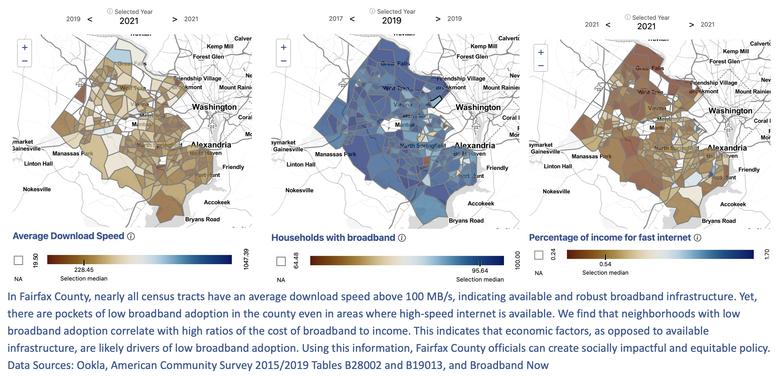
UVA’s Biocomplexity Institute Expands Work Informing Smarter, More Equitable Growth Across Northern Capital Region
Phase Two Funding from Mastercard Center for Inclusive Growth Powers Social Impact Data Commons Expansion
From coast to coast, communities across the United States rely on a wide variety of data to inform decision making on everyday issues ranging from food availability and traffic flow to business development. To be useful, these data must be timely, geographically relevant, and topical to the decisions at hand. The challenge is that many local leaders lack not only the sophisticated analytical tools necessary to collect and curate these data, but also the staff capacity to analyze and apply the knowledge gained in a meaningful way.
With support from the Mastercard Center for Inclusive Growth, Mastercard’s philanthropic hub, the University of Virginia’s Biocomplexity Institute has set out to change this reality. Since fall 2021, the Institute’s Social and Decision Analytics Division (SDAD) has led a cross-disciplinary team in developing an open curated knowledge repository called the Social Impact Data Commons that co-locates data from a variety of sources, including public datasets, administrative records, and private entities. Uniquely, the Data Commons also integrates analytical tools designed to track issues over time and geography, enabling local government and community leaders to continuously learn from and make decisions based on their own real-time data.
“We aim to advance the field of data for social impact and increase organizational use of data science to drive equitable outcomes,” said Shanna Crumley, Director of Impact Data Science at the Mastercard Center for Inclusive Growth. “There are so many opportunities to bring more coordination and an ecosystem perspective to data for social impact. It’s important to bring awareness to this field and build data capacity that can be scaled, which UVA has helped us to do. Building all of these tools, resources, and knowledge is important for inclusive, sustainable, and equitable growth, and we at the Center are very excited to continue working with this team on these issues.”
The Institute team has developed the Social Impact Data Commons with the goal of informing equitable growth for localities in the Washington, D.C. metropolitan region – collectively referred to as the Northern Capital Region. The Institute’s work is grounded in solving specific, pressing local issues.
“Our challenge is to support equity-informed decision making at the local level, which means we need to work with each locality to define issues that need better local data to facilitate decision making and then iterate through potential solutions,” said Aaron Schroeder, Principal Investigator and Research Associate Professor in the Institute’s SDAD. “We work with community personnel to identify these critical issues so we can provide immediate benefit from the use of these new data and metrics.”
The work began in Virginia’s Arlington County where the Institute team partnered with county officials to better understand social impact issues including equity of broadband access and access to staple foods. To garner meaningful information from the data, the team developed data repositories for people and computers, applications such as dashboards to review the data, and tools such as tutorials and maps to support analysis and understanding.
Additional funding from the Mastercard Center for Inclusive Growth enabled a second phase of work, spanning from September 2022 through July 2023. In this phase, the team has expanded its scope to include Virginia’s Fairfax County, which forms part of Washington, D.C.’s suburban ring. Here, they are tackling a broad range of issues which also includes broadband access and food security as well as diversity of business ownership and business district health and longevity, among others.
“Partnering with the Biocomplexity Institute at UVA has given us the ability to do a deeper dive into data that we don’t have the capacity to access or analyze internally,” said Michelle Gregory, Director of Data Analytics, Fairfax County. “This project enables work that local jurisdictions haven’t had the ability to pursue due to lack of capacity, and in some cases, a lack of expertise to develop new models and ways of answering questions that are critical to our growth and development with data-backed evidence.”
Gregory explained that Fairfax County officials identified issues to address through the Social Impact Data Commons work based on a blended criteria including: 1) those that had already been flagged as high priority; 2) areas where there was staff capacity to actively engage in and inform the effort; and, 3) issues that previously had data gaps. These criteria help ensure that the team makes meaningful progress in areas that are most vital to the community.

“In both Arlington and Fairfax Counties where we were looking at broadband equity, the data show that the areas with the lowest broadband adoption appear to demonstrate a higher proportion of income being allocated toward broadband costs, indicating that broadband use is an economic issue as opposed to one of availability. These data were presented to the Arlington County Council and Fairfax County Board of Supervisors, directly informing the region’s resource planning, which is very exciting for us,” Schroeder said.
The Biocomplexity Institute team is developing all data, code, applications, and tools for the Social Impact Data Commons with transparent, open-source technology so it is replicable and scalable for other regions in the U.S. undergoing economic change.
“We built the Data Commons to democratize data insights for local communities across the country. This early work has helped establish a solid foundation for further expansion across the National Capital Region and elsewhere in the future,” said Stephanie Shipp, acting director of the Institute’s SDAD. “With more widespread utilization, we can look forward to more intelligent, data-informed growth and decision making in communities nationwide, providing that aptitude to localities that previously did not have the tools, capacity, or resources.”
According to Michelle Gregory, there is also significant value for the jurisdictions who have been involved from the outset. “To be involved in this project from the beginning stages is very exciting,” she said. “The challenges we’re dealing with in Fairfax County are common to other localities as well, so it’s an opportunity to feel like you’re part of something that will help many others.”
For more information please visit the Social Impact Data Commons project page.